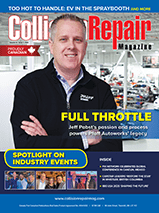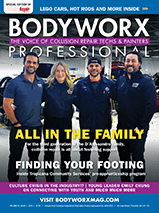In our industry, it’s easy to learn something new every day
By Darryl Simmons
You’re supposed to learn something new every day— at least that’s what the old adage says. This fact rings especially true as we navigate the elementary and secondary education streams—but how often do you sit down now, in your adult life, and ponder what you learned in a day?
We live in an age of information. It takes twenty seconds to type a question into the Google machine—and, if you’ve posed your question coherently, it’ll probably toss you an atleast semi-correct answer. Learning something new every day has never been easier—you needn’t look further than the 700+ collision repair industry course listings on trainingmatters. ca to find stellar education providers in our very own sector. Our industry endures a change at a rapid pace. It’s one of the biggest perks of the job, but it’s also one of the main challenges. In collision repair, Google cannot provide an accurate answer to all our questions. Fortunately, for someone looking to learn something new with every new day, every new model year, every new special edition colour that the OEMs draw out: this industry is definitely up your alley.
The automotive sector currently offers endless new opportunities to be excited about, and countless reasons as to why we should be excited for them. Electric vehicles, anyone? It’s only a matter of time before working on a Teslatype vehicle becomes your everyday norm. Do you know how to work around a high-voltage EV battery? Don’t worry—we’ve got info on that. Are you ready to meddle and work with the complexities of ever-changing body materials? Again—fear not, Collision Repair has got you covered.
Similarly so, autonomous vehicles are on the horizon. The way autopilot works—and the still-questionable role it plays in collisions—is sure to affect insurance and claims operations, and thus the way the industry processes repairs. You may not believe it now, but this, too, will require training—especially if you work in a forward-thinking, operations-minded facility. So, vehicle autonomy and high-tech thingamabobs considered, you do, unfortunately, still require a brain. We’re not yet at the point where robots can conduct your repairs or accurately fit parts for you. Perhaps someday we’ll get there but, even then, we’ll need to train somebody on how to maintain the things. A Harrison Ford-type personality, circa Blade Runner. But we don’t recommend falling in love with the robots. Maybe that’s a training course to look out for in the future.























